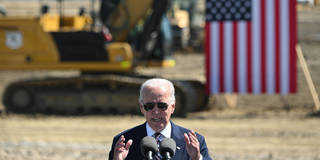The Biden administration has turned its back on free trade, arguing that decades of globalization have not benefited US manufacturing workers. That may be true, but its new plan for a “fairer, more durable” international economic order is unlikely to improve their wages or job prospects.
MILAN – US trade policy is on the cusp of a major transformation. In a recent speech at the Brookings Institution, Jake Sullivan, President Joe Biden’s national security adviser, outlined the administration’s strategy to “build a fairer, more durable global economic order.” At the heart of this new approach is the belief that, although the world has reaped the benefits of free trade over the past several decades, American workers got a raw deal.

MILAN – US trade policy is on the cusp of a major transformation. In a recent speech at the Brookings Institution, Jake Sullivan, President Joe Biden’s national security adviser, outlined the administration’s strategy to “build a fairer, more durable global economic order.” At the heart of this new approach is the belief that, although the world has reaped the benefits of free trade over the past several decades, American workers got a raw deal.